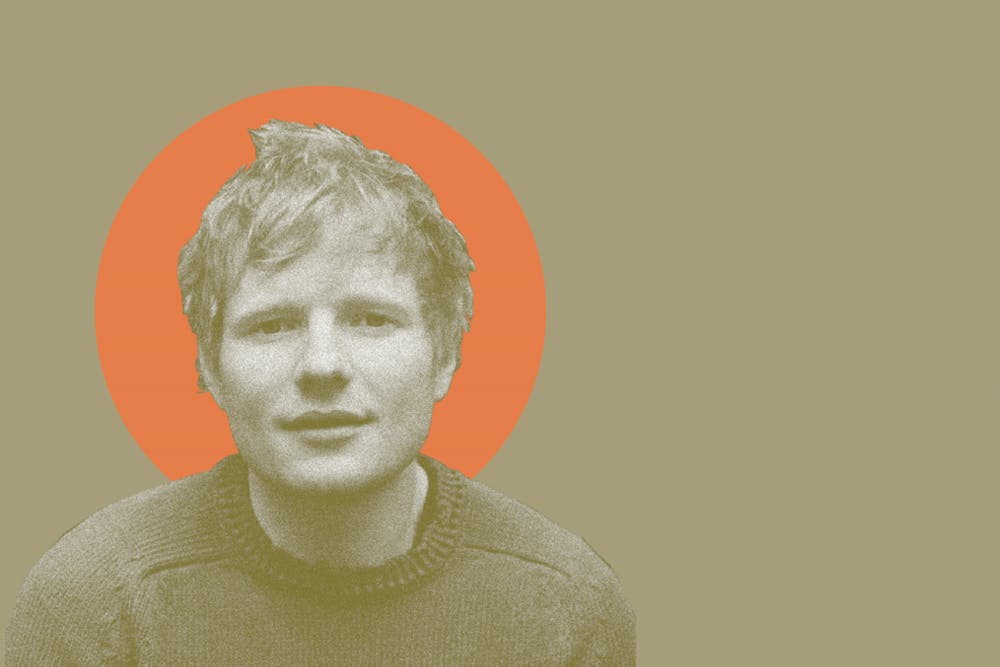When I think of Ed Sheeran, I think of my thirteen–year–old self scrolling through tumblr. I think of warm drinks and cozy blankets, listening to the soothing guitar strings that defined his debut album + (Plus). I remember listening to “The A Team” and “Drunk,” pretending I could relate to the lyrics despite my limited life experiences. In my head, the image of Sheeran and his music had remained pretty stable since then—even through his new albums and newfound status as one of Gen Z’s big inside jokes.
What caused a great disruption from that image was listening to his new album, = (Equals). The whole premise of Equals is that now, Ed Sheeran is all grown up. Unfortunately, instead of growing with him, his music took a complete one–eighty from the comforting sound that defined him in favor of beats that aspire to be radio friendly. The greatest weakness of Equals mainly stems from a simple fact: many songs don’t sound like him at all. It’s not only that they don’t sound like him, they’re reminiscent of other artists—all of whom are the complete opposite of Sheeran.
Take one of the singles, “Shivers." The track could very well be the Jonas Brothers' “Sucker” of another dimension—he’s emulating his best JoBro moment. The electronic sound and synth in the background make for a catchy, vibrant tune, straight from late 2010s mainstream pop. But it’s so incompatible with Ed Sheeran that listening to it and knowing it’s him is almost jarring.
A similar situation occurs with “Overpass Graffiti,” which is reminiscent of ‘80s pop through the upbeat sound and bass. However, it falls short of other artists who achieved a similar sound, such as The Weeknd's hit “Blinding Lights.” “Collide” similarly sounds like it belongs to the end credits of a late ‘90s romantic comedy, right after the nerd turns into the popular girl; it could serve as a revamped version of Natalie Imbruglia’s 1997 hit “Torn.” The problem is not that Sheeran doesn’t sound like himself, it lies in the fact that every one of these songs sounds like a different artist.
After taking a break from music, it’s clear that Sheeran wants to come back in full force—and he’s doing that by creating more radio friendly music. This itself isn’t a negative thing. He has previously received major recognition through other songs, such as “Thinking Out Loud” from Multiply and “Shape of You” from Divide. However, these two songs, in addition to being radio successes, were unequivocally representative of Sheeran’s vibe. This is not the case with songs like “Bad Habits” and “Stop the Rain.” Sheeran continues to strive for success, but with songs that actually sound like mainstream pop.
Despite these criticisms, Sheeran’s genius shines through in other moments of the record. Yes, one of his main strengths has always been the comforting nature of his music. But the other one is his lyricism, and it continues to be powerful even through sonic misses.
“Visiting Hours” exemplifies Sheeran's strength for writing sentimental lyrics. When listening to it for the first time—after I willed myself to get past the slightly Christian Pop sound—the song almost brought tears to my eyes. Sheeran sings to a family member who passed away, wishing he could talk to them to share how his life has changed, to ask for advice. He wishes that heaven had visiting hours, “So I could just show up and bring the news / That she’s gettin’ older and I wish that you’d met her / The things that she’ll learn from me / I got them all from you.” The song is sweet and highlights his knack for lyricism in a great way.
Other tracks also recall the Sheeran of the past. In “2step,” he brings back the rap that he successfully executed in his previous albums. In the second verse he raps, “‘Cause we’re living life at a different pace, stuck in a constant race / Keep the pressure on, you’re bound to break / Something’s got to change,” with impressive ease. “2step” reminds me of one of Sheeran’s most satisfying songs, “Don’t”—which I tried to memorize back in 2014 just to be able to sing along to it.
Overall, though, the song that sounds like Sheeran in his purest form is “First Times”—one of the best on the record. It has beautiful guitar strums, a whisper–like voice, almost strained but not quite. The sound is calming, a reassuring lullaby detailing just how his life has changed throughout the years. He sings to his wife, commemorating the beauty of their relationship: “Ain’t it funny how the simplest things in life can make a man? / Little moments that pass us by / Oh but I remember / The first kiss, the first night, the first song that made you cry…” The song is everything that made Plus successful, but better. It doesn’t just seem like a song from his debut album, “First Times” truly feels like what Equals could have been if his music had actually grown with him instead of just … changing.
Change can be good for artists. Performers are allowed to evolve and reinvent themselves; they are basically required to, especially if they have been in the industry for long. Taylor Swift has become even more successful throughout her career because of these changes and “eras.” Nonetheless, for Sheeran, Equals mostly felt like a step back—an underwhelming comeback from a period of radio silence.
Ed Sheeran used to remind me of comfort, strong lyricism, guitar strumming, warm drinks—I used to think about fall. Now, my perception of Sheeran is more convoluted, a mixture of sounds and styles I would not have expected together. Ed Sheeran’s talent as a songwriter is undebatable, but Equals is simply not a representation of his skills. Hopefully, in the future, he plays his strengths to further develop his sound without completely wandering the other way.

